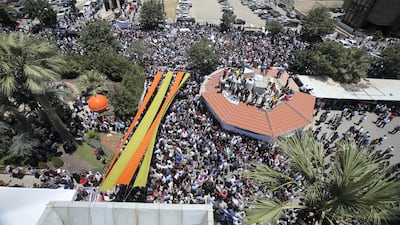Jordanians staged the first nationwide strike in decades on Wednesday to protest against IMF-guided tax reforms approved by the government earlier this month in a bid to boost revenues, tame the budget deficit and cut spiralling public debt.
The strike, called by the country's professional associations, is the first such mass industrial action with many Jordanians fearing that they will be forced to shoulder a greater share of the tax burden at a time when complaints about poverty and unemployment are growing louder.
In Amman, thousands gathered at the professional associations complex and chanted against the government of Hani Mulki and demanded his resignation over the new amendments to the income tax law.
"Down with Hani Mulki," they chanted. "Death rather than humiliation."
Protesters held banners that read "no to squashing the middle class," and "No to the income tax law."
Addressing the crowds, association leaders called on the government to withdraw the bill and open a dialogue with citizens before the bill takes effect.
Some asked for the intervention of the King as they have given up all hope in their government's ability to improve the economy.
"If the government does not want to listen to the crowds, it must immediately step down," Abdul Hadi Falahat, president of the Jordan Agricultural Engineers Association, told the crowds. "We want the king to intervene and (lead) a comprehensive national dialogue where we discuss political reforms, participation in decision making and sound economic reforms that would salvage the country from its political and economic crises."
Zeid Kilani, the head of the Jordan Pharmacists Association, said this strike was an unprecedented message from the Jordanian people who are unified against the income tax law.
There were walkouts across the country in many industries impacting services and closing shops and malls until 2pm.
Employees formed picket lines outside their workplaces to protest the law.
"We are against laws that are imposed on us," said Shatha Issa, a pharmacist at Rida Jardaneh Drug Store in Amman. "We are all employees with average salaries…and our salaries will shrink rather than increase, even for the business owners. Every now and then we have price increases. The prices of fuel went up and there were sales tax hikes, while the salaries did not increase."
"The main problem with this law is that it came at the wrong time, because people have already been overburdened by too many tax increases and too many subsidy cuts…without a wage increase and a decrease in per capita income," said Jawad Anani, a Jordanian economist and a former deputy prime minister.
"People feel the pinch and there is a big pebble in their shoes," he said. "This is causing social pain."
The amended income tax bill entails expanding the taxpayer base by levying a five per cent tax on individuals earning 8,000 Jordanian Dinar (Dh 41,448) annually – previously for those earning over 12,000 Jordanian Dinar (Dh 62,000) – or for families earning a combined income over 16,000 Jordanian Dinar (Dh 83,000) annually – down from 24,000 Jordanian Dinar (Dh 124,000) a year previously.
The move comes after a round of austerity measures adopted by the government earlier this year which almost doubled the prices of bread, fuel and increased sales taxes on hundreds of everyday goods from internet subscriptions and electricity to soft drinks and stationery.
The government said the amendments were needed to prevent tax evasion, address tax avoidance and improve tax administration and collection.
________________
Read more:
Jordan’s economy to see modest growth next year expanding by 3 per cent
S&P affirms Jordan's ratings on greater fiscal reforms hopes
Jordan’s economic plans to be applauded – but can it proceed with them?
________________
“The government is aware that this law is unpopular, but it pays attention to the interest of the country,” Mr Mulki told representatives of the professional associations on Monday.
"The national responsibility requires us to do so," the government's Petra news agency reported him as saying.
The tax reform is part of measures the government has adopted since a three-year agreement with the IMF in 2016 to help generate revenue and cut public debt. Gross public debt increased from 67 per cent of GDP at end-2010 to 95.8 per cent of GDP by the February-2018 – or approximately 27.7 billion Jordanian dinars (Dh143.5 billion). The IMF backed plan is aiming to cut that to 77 per cent of GDP by 2021.
Real GDP growth was revised downwards to two per cent in 2017, about one per cent lower than anticipated at the start of the IMF program when it was expected to hover around around per cent – almost half the levels it attained a decade ago.
Contributing to the drop in economic performance has been the impact of the next door Syrian conflict and the burden of hosting tens of thousands of refugees.
But the reforms come at a time when a sluggish economy and slow growth are already making the lives hard for many Jordanians. With 18.5 per cent unemployment and 14.4 per cent complaining of poverty and stagnant salaries that don't match the price increases, many are feeling the pinch.
While the vast majority of Jordanians do not earn enough to qualify for income tax, the government expects to generate 300 million Jordanian Dinar (Dh 1.5 billion) annually in three years.
Still, critics said the amendments are a heavy blow to the country's middle class, the backbone of the economy.
Ahmed Awad, director of the Phenix Centre for Economic and Informatics Studies in Amman, said those who will suffer most include professionals including doctors, lawyers and engineers.
"This is the first social protest in Jordan in 20 years because the professionals felt they were targeted," he said.
Others said Jordanians have already been tightening their belts. With new taxes, they will feel the effects harder.













